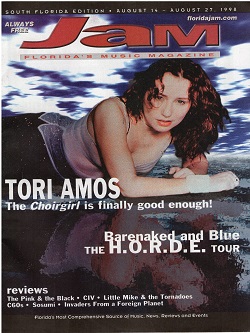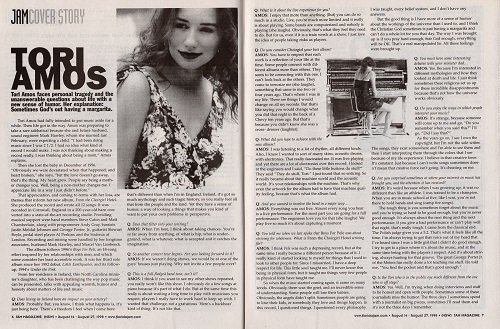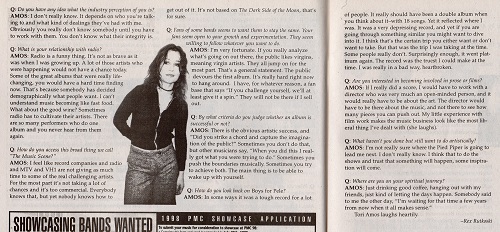|

songs | interviews | photos | tours | boots | press releases | timeline
Jam (US)
Florida's Music Magazine
August 14, 1998

The Choirgirl is finally good enough
by Rex Rutkoski
* The interview was previously printed in the July 16, 1998 issue of Scene, but the version in Jam included a few additional questions:
Q: Do you consider Choirgirl your best album?
Amos: You have to respect that each work is a reflection of your life at the time. Some people connect with different albums more than others. They seem to be connecting with this one. I can't look back at the others. They come to terrorize me (she laughs), something that came to me two or four years ago. That's where I was in my life. There are things I would change on all my records. But that's like saying you would change what you did that night in the back of a Chevy ten years ago. But that's because you didn't know she was a cross-dresser (laughter).
Q: What did you hope to achieve with the new album?
Amos: I was listening to a lot of different rhythm, all different kinds. Also, I knew I wanted to sort of marry skins, acoustic drums, with electronics. That really fascinated me. It was live playing and yet there are a lot of electronics over this record. I looked at the engineers and I said, "Do these little buttons do stuff?" They said, "They do stuff, Tori." I just found that so enticing. So it really became about the machine world and the acoustic world. It's your relationship with the machine. That's why even the artwork for the album had to have that machine quality feeling, because that's what the album had.
Q: And you wanted to involve the band in a major way...
Amos: Everything was cut live. Almost every song you hear is a live performance. For the most part you are going for a full performance. The engineers love you for that (she laughs). We play live so much it's about capturing a moment.
Q: Do you have any idea what the industry perception of you is?
Amos: I don't really know. It depends on who you're talking to and what kind of dealings they've had with me. Obviously you really don't know somebody until you have to work with them. You don't know what their integrity is.
Q: What is your relationship with radio?
Amos: Radio is a funny thing. It's not as brave as it was when I was growing up. A lot of those artists who were happening would not have a chance today. Some of the great albums that were really life-changing, you would have a hard time finding now. That's because somebody has decided demographically what people want. I can't understand music becoming like fast food. What about the good wine? Sometimes radio has to cultivate their artists. There are so many performers who do one album and you never hear from them again.
Q: How do you access this broad thing we call "The Music Scene?"
Amos: I feel like the record companies and radio and MTV and VH1 are not giving as much time to some of the real challenging artists. For the most part it's not taking a lot of chances and it's too commercial. Everybody knows that, but yet nobody know how to get out of it. It's not based on The Dark Side of the Moon, that's for sure.
Q: Fans of some bands seem to want them to stay the same. Your fans seem open to your growth and experimentation. They seem willing to follow whatever you want to do.
Amos: I'm very fortunate. If you really analyze what's going on out there, the public likes virgins, meaning virgin artists. They all jump on for the most part. That's a general statement. The public devours the first album. It's really hard right now to hang around. I have, for whatever reason, a fan base that says, "If you challenge yourself, we'll at least give it a spin." They will not be there if I sell out.
Q: By what criteria do you judge whether an album is successful or not?
Amos: There is the obvious artistic success, and "Did you strike a chord and capture the imagination of the public?" Sometimes you don't do that, but other musicians say, "When you did this I really got what you were trying to do." Sometimes you push the boundaries musically. Sometimes you try to achieve both. The main thing is to be able to wake up with yourself.
Q: How do you look back on Boys for Pele?
Amos: In some ways it was a tough record for a lot of people. It really should have been a double album when you think about it -- with 18 songs. Yet it reflected where I was. It was a very depressing record, and yet if you are going through something similar you might want to dive into it. I think that's the certain trip you either want or don't want to take. But that was the trip I was taking at the time. Some people really don't. Surprisingly enough, it went platinum again. The record was the truest I could make at the time. I was really in a bad way, heartbroken.
Q: Are you interested in becoming involved in prose or films?
Amos: If I really did a score, I would have to work with a director who was very much an open-minded person, and it would really have to be about the art. The director would have to be there about the music, and not there to see how many pieces you can push out. My little experience with film work makes the business look like the most liberal things I've dealt with (she laughs).
original article


[scans by Sakre Heinze]
t o r i p h o r i a
tori amos digital archive
yessaid.com
|